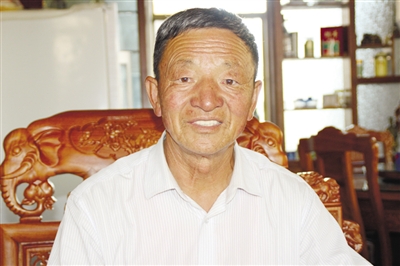Herdsman determined to control desertification
Updated: 2017-08-25  Print
Print 




Su Shuanhai, 68, is keen on planting trees. The herdsman lives in a village in Erdos, North China's Inner Mongolia autonomous region.
His successful efforts to combat desertification have been so inspirational that in 2008 China's national TV network, CCTV, featured his story. In 2011, Su was named "Erdos' Pacesetter in Conserving Forest Ecology".
More than 30 years ago, Su contracted to manage a pastureland of 453.3 hectares under China's household-contract responsibility system that is still in force.
Brutal Environments
The so-called pastureland was essentially a large tract of barren sandy land less than 5 percent of which had any vegetation.
Su's case was not an exceptional one, as the pasturelands that his neighbors managed by contract looked the same as his. It seemed that he had no choice but to work hard at cultivating the land.
Unexpectedly, the seasonal sandstorms wreaked havoc on Su's poor small plot of grassland in spring and summer, uprooting the crops in the field and forcing him to replant several times a year.
What's even worse, more than a dozen cattle and sheep starved to death with no grass to eat. The whole family suffered so much from the sandstorms, making it difficult for them to cover their basic living costs.
Su realized that there was no way out of the predicament except to plant trees and control the factors causing sandstorms. To live and create a better future, he had to make efforts to conserve and cultivate forests and woods. So he began buying and planting saplings in tiny batches.
As the old saying goes, chance favors only the prepared. Just as Su planned to buy more saplings, the Chinese government introduced a tree-planting policy called the Three-North Forest Shelterbelt Development Program, also known as the Green Great Wall.
It is designed to limit the expansion of deserts in the country's northern regions by forming a series of human-planted windbreaks in all three northern regions: Northwest China, North China and Northeast China.
Undertaking to build Green Great Wall
Encouraged by the national tree-planting policy, Su took an active part in the forest conservation project. Planting trees and shrubs became a top priority for him and his family.
Teaming up with his family members, Su trekked deep into the hinterland of the barren areas overtaken by deserts, setting up checkbox barriers, a kind of defense against the sand, and growing trees and shrubs inside them.
In a bid to plant more trees, he poured money into buying saplings by selling more than 100 sheep, borrowing money from friends and taking out bank loans.
Rain rarely fell where Su lived, making it hard for the saplings to survive. Therefore, in the short-term rainy seasons, Su hired dozens of herdsmen to plant saplings, which began to register higher survival rates.
No matter how tough the circumstances were and how hard he was tested physically and mentally, Su stuck to the firm belief that "only when the woods and forests are formed and the sandstorms controlled can local people hold out hope for a better future". He believed that tree planting would lead to prosperity.
Su's behavior inspired his friends and neighbors. More herdsmen joined in planting trees. The local authorities, moved by Su's spirit and thinking, provided him with more saplings and financial support.
Tree-planting Achievements
The people's great efforts finally paid off. Within decades, many human-planted windbreaks of trees and shrubs had been formed. The forest shelterbelts kept the sand in check, allowing people to reap harvests from their green grassland.
As agriculture and husbandry improved local households saw their annual income increase year by year.
As for Su, he witnessed the enormous change brought by the efforts to plant windbreaks and prevent desertification. Nearly 70 percent of the old barren sand has now been covered by forest. He still thinks it was really a miracle.
"So long as I can still breathe, I will never stop planting trees and combating desertification," Su says.





 Ordos Impression
Ordos Impression Ordos WeChat
Ordos WeChat Ordos Reported
Ordos Reported
